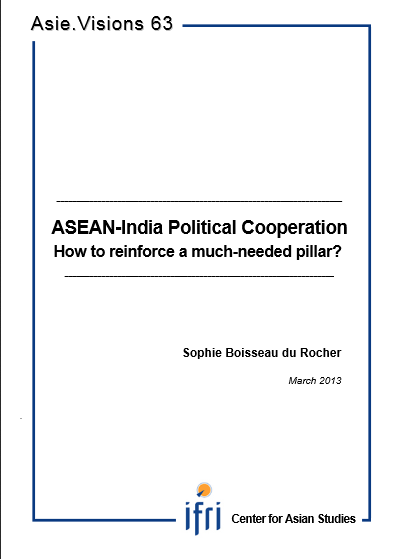ASEAN-India Political Cooperation: How to reinforce a much-needed pillar?

India is one of Southeast Asia’s principal neighbors and there is certainly great potential for cooperation with the region and its institutional representation, ASEAN. But does India properly exploit this opportunity? Is Southeast Asia satisfied with the level of engagement?
The bases for cooperation are strong. Since ancient times India’s soft power has played a unique role in Southeast Asia and has contributed to shaping the region’s political culture. Even if colonialism and the Cold War hampered these links, they have been revived with India’s “Look East Policy” in the early 1990s. The relationship has since gathered momentum and evolved into a broad-level interaction encompassing economic and security pillars.
Nevertheless, this study shows that political linkages remain weak and penalized by the absence of a clear vision. This reality is indeed worrying and there is concern that between rising economic and security imperatives there is no room, no time and no investment for a much needed, constructive political dialogue.
The basic argument of this paper is that the missing political link might be detrimental to the whole relationship. The ASEAN - India framework for political cooperation has no substance and could not play a functional role in case of uncertainty or tensions. In a context of growing competition with China, both India and ASEAN need a reinforced partnership that includes a functional form of political cooperation.

Available in:
Regions and themes
ISBN / ISSN
Share
Download the full analysis
This page contains only a summary of our work. If you would like to have access to all the information from our research on the subject, you can download the full version in PDF format.
ASEAN-India Political Cooperation: How to reinforce a much-needed pillar?
Related centers and programs
Discover our other research centers and programsFind out more
Discover all our analyses
RAMSES 2024. A World to Be Remade
For its 42nd edition, RAMSES 2024 identifies three major challenges for 2024.

France and the Philippines should anchor their maritime partnership
With shared interests in promoting international law and sustainable development, France and the Philippines should strengthen their maritime cooperation in the Indo-Pacific. Through bilateral agreements, expanded joint exercises and the exchange of best practices, both nations can enhance maritime domain awareness, counter security threats and develop blue economy initiatives. This deeper collaboration would reinforce stability and environmental stewardship across the region.

The China-led AIIB, a geopolitical tool?
The establishment of the Asian Infrastructure Investment Bank (AIIB) in 2016, on a Chinese initiative, constituted an attempt to bridge the gap in infrastructure financing in Asia. However, it was also perceived in the West as a potential vehicle for China’s geostrategic agendas, fueling the suspicion that the institution might compete rather than align with existing multilateral development banks (MDBs) and impose its own standards.
Jammu and Kashmir in the Aftermath of August 2019
The abrogation of Article 370, which granted special status to the state of Jammu and Kashmir (J&K), has been on the agenda of the Bharatiya Janata Party (BJP) for many decades.







